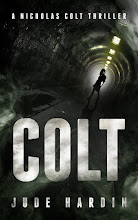Can't Start A Fire Without A Spark
I don’t outline. Not in any “normal” way.
Sometimes, I wish I could. Or, better yet, that someone would do it for me. Just give me a nice complete skeleton of The Perfect Plot, and I fill in the blanks.
Wouldn’t that be nice?
Sure. But it wouldn’t be real.
For me, a story must grow organically. Characters aren’t something you cut out of a magazine. Plots aren’t something you contrive. Plots happen because of who the characters are, their reactions under stress, their motivations as living, breathing beings.
Everything else is a lie. And we, as fiction writers, don’t want to tell lies, do we? No. We want to find the truth. That’s why we do this.
Sometimes, finding the truth takes some digging.
Recently, I’ve been spending a lot of time filling in behind-the-scenes information for my work in progress, i.e. what happens offstage.
Why is this important?
One word: Are you listening? Listen closely now...
Plastics.
Oops! Wrong word.
Plastics are artificial. Plots are artificial. We don’t want artificial. We want organic.
The word I had in mind was catalyst.
The action offstage acts as a catalyst for what the reader sees, and what the characters onstage ultimately do.
Why did a young lady show up at my protagonist’s door, seeking help to find her runaway sister? An entire series of events, that happened offstage, compelled her. Most of that backstory will never make it into the finished book; but, it’s important for me, the author, to know, because to truly understand my characters, I need to know what motivates them. The why of their actions, onstage and off.
For every stick of dynamite that explodes onstage, a fuse must first be lighted behind the scenes. I need to know who, what, when, where, why. Especially why.
Know where your sparks originate, and that big old thing we call Story will suddenly fall into place.
Sometimes, I wish I could. Or, better yet, that someone would do it for me. Just give me a nice complete skeleton of The Perfect Plot, and I fill in the blanks.
Wouldn’t that be nice?
Sure. But it wouldn’t be real.
For me, a story must grow organically. Characters aren’t something you cut out of a magazine. Plots aren’t something you contrive. Plots happen because of who the characters are, their reactions under stress, their motivations as living, breathing beings.
Everything else is a lie. And we, as fiction writers, don’t want to tell lies, do we? No. We want to find the truth. That’s why we do this.
Sometimes, finding the truth takes some digging.
Recently, I’ve been spending a lot of time filling in behind-the-scenes information for my work in progress, i.e. what happens offstage.
Why is this important?
One word: Are you listening? Listen closely now...
Plastics.
Oops! Wrong word.
Plastics are artificial. Plots are artificial. We don’t want artificial. We want organic.
The word I had in mind was catalyst.
The action offstage acts as a catalyst for what the reader sees, and what the characters onstage ultimately do.
Why did a young lady show up at my protagonist’s door, seeking help to find her runaway sister? An entire series of events, that happened offstage, compelled her. Most of that backstory will never make it into the finished book; but, it’s important for me, the author, to know, because to truly understand my characters, I need to know what motivates them. The why of their actions, onstage and off.
For every stick of dynamite that explodes onstage, a fuse must first be lighted behind the scenes. I need to know who, what, when, where, why. Especially why.
Know where your sparks originate, and that big old thing we call Story will suddenly fall into place.

